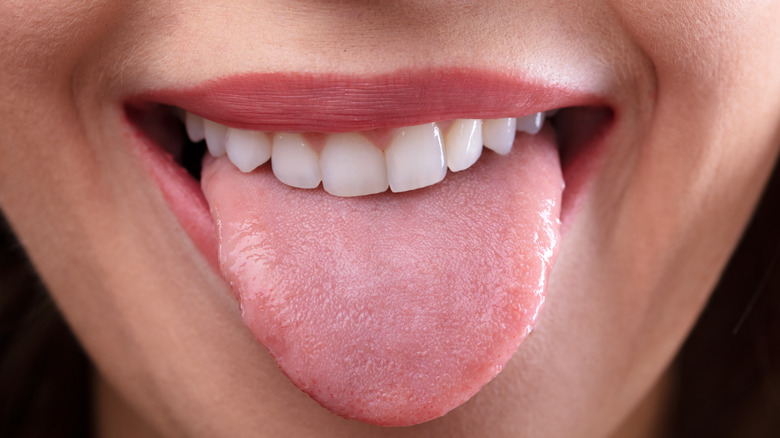This Is What Your Tongue Is Doing When You're Asleep
While we're busy catching some zs, our body is still working around the clock all hours of the night to keep our essential organs functioning as needed. While many systems slow down during the course of the night, our brain is still busy consolidating information, while our body is busy regulating hormone production, digesting food, and boosting immunity, amongst other tasks (via Sleep Foundation). As it turns out, another organ is also hard at work while we're snoozing away and it's an organ that you probably never would've guessed — the tongue.
The tongue serves many different functions such as swallowing, the formation of speech, and taste detection (via Journal of the South African Dental Association). Kept moist by a mucous membrane, the surface of the tongue is covered in papillae, which are the bumps that contain our taste buds (via WebMD). The nerves that run from the tongue to the brain are able to communicate which of the main taste categories are being detected — sour, sweet, salty, or bitter.
It's safe to assume that you're probably not eating in your sleep. So if your tongue isn't busy detecting flavors, what is it doing instead during the nighttime?
Position your tongue like this for better sleep
While asleep, our salivary glands slow down their levels of saliva production (via LêDowns Dentistry). Our tongues then work the saliva still being produced towards the back of the throat for swallowing (via Kids Health). Not only does this help avoid excessive drooling while sleeping, but it also betters our quality of rest by preventing sleep disturbances from constant swallowing.
On the other hand, your tongue can also hinder your quality of sleep. According to The Joint Chiropractic, your tongue's positioning in your mouth while sleeping can influence just how restful your night's sleep will be. To prevent airway blockage, the tongue should sit at the roof of your mouth behind your top front teeth. Assuming this relaxed position will trigger the release of hormones including dopamine and serotonin, which can enhance your quality of sleep. The key is to keep the muscle loose rather than tense. Should your tongue drift away from the roof of the mouth while sleeping, this can lead to teeth grinding and open mouth breathing, as well as shoulder and mouth tension.
Who would have thought that our tongue could play such an important role in our sleep cycle? By keeping your tongue properly positioned and letting it do its job, you may find your night's sleep to be all the more restful.


